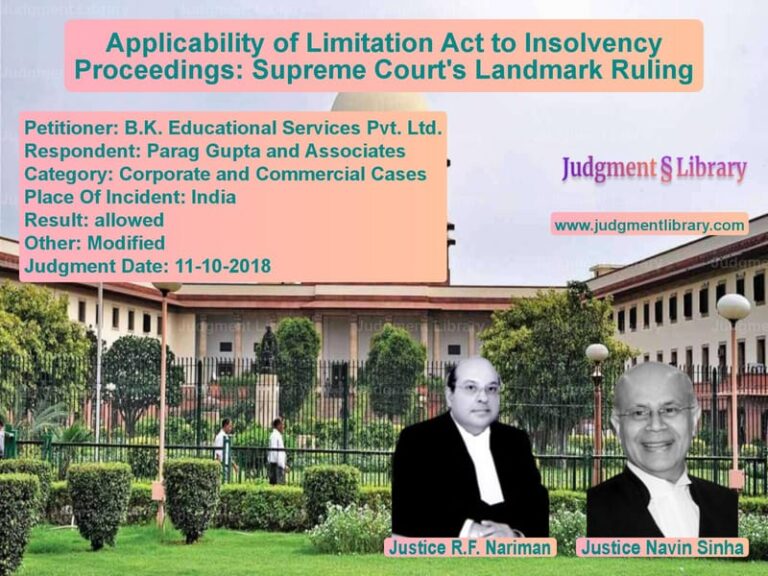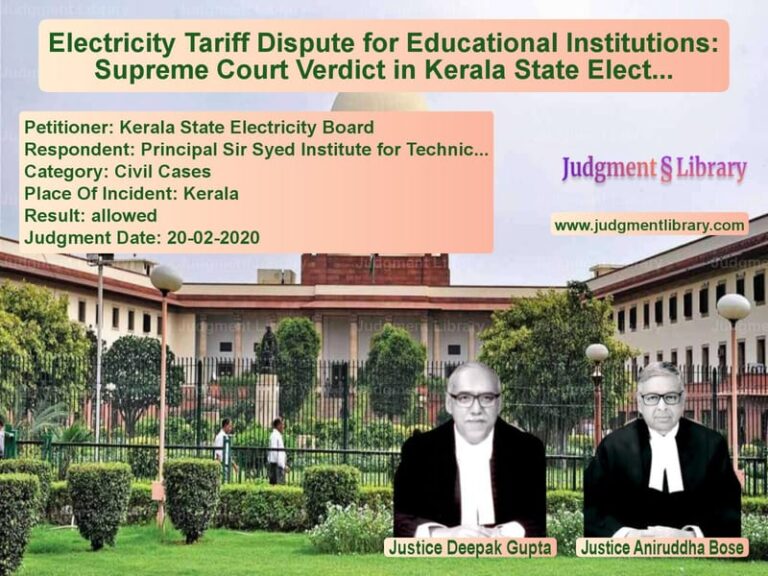Supreme Court Allows Extension of Time for Arbitral Award Beyond Expiry Period
The case of Rohan Builders (India) Private Limited vs. Berger Paints India Limited dealt with the issue of whether an application for extension of time under Section 29A of the Arbitration and Conciliation Act, 1996 (A&C Act) can be filed after the expiry of the prescribed period for making an arbitral award. The Supreme Court, in its judgment dated September 12, 2024, overruled the Calcutta High Court’s decision and held that courts have the power to extend time for arbitral proceedings even after the initial period of twelve months (or extended six months) has expired.
This judgment resolves conflicting views among various High Courts on whether an arbitral tribunal’s mandate is automatically terminated once the prescribed time expires, or whether it can be revived through a court order.
Background of the Case
The dispute arose between Rohan Builders (India) Private Limited (appellant) and Berger Paints India Limited (respondent) over contractual obligations. The parties had agreed to resolve their disputes through arbitration, and an arbitral tribunal was constituted.
Read also: https://judgmentlibrary.com/supreme-court-grants-post-award-interest-in-arbitration-dispute/
The key legal issue revolved around Section 29A of the Arbitration and Conciliation Act, 1996, which governs the time limit for making an arbitral award:
- Under Section 29A(1), an arbitral award must be made within twelve months from the completion of pleadings.
- Section 29A(3) allows the parties to extend this period by an additional six months through mutual consent.
- If an award is not made within this timeframe, Section 29A(4) states that the arbitrator’s mandate terminates unless the court extends the period.
The arbitral tribunal in this case failed to deliver its award within the stipulated period. After the expiry of the initial twelve-month period and the extended six-month period, the appellant approached the Calcutta High Court seeking an extension under Section 29A(4).
Calcutta High Court’s Ruling
The High Court of Calcutta rejected the appellant’s application, holding that:
- Once the time for making an arbitral award had expired, the tribunal’s mandate was automatically terminated.
- The court lacked the power to extend time under Section 29A(4) once the period had lapsed.
- The only option available to the parties was to initiate fresh arbitration.
This view was also supported by the Patna High Court in a similar case. However, other High Courts, including the Delhi High Court, Bombay High Court, and Madras High Court, had taken a contrary stance, allowing courts to extend the arbitral tribunal’s mandate even after the expiry of the time period.
Read also: https://judgmentlibrary.com/supreme-court-directs-arbitration-in-cox-kings-vs-sap-india-dispute/
Appeal Before the Supreme Court
The appellant challenged the Calcutta High Court’s decision before the Supreme Court, arguing:
- Section 29A(4) allows courts to extend time even after the expiry of the arbitration period.
- A strict interpretation of the provision would lead to an unfair and impractical result, forcing parties to restart arbitration afresh.
- Several High Courts, including those of Delhi and Bombay, had ruled that courts retain the power to extend time even post-expiry.
Supreme Court’s Observations
The Supreme Court bench, comprising Justices Sanjiv Khanna and R. Mahadevan, examined the language of Section 29A and its legislative intent.
1. The Power to Extend Time Exists Even After Expiry
- The Court ruled that courts have the authority to extend time under Section 29A(4), even after the expiry of the arbitration period.
- The phrase “prior to or after the expiry” in Section 29A(4) explicitly allows courts to extend time even post-expiry.
2. The Arbitrator’s Mandate is Not Absolutely Terminated
- The Court clarified that termination of the arbitral tribunal’s mandate under Section 29A(4) is not absolute and can be revived through a court order.
- This interpretation ensures that arbitration proceedings are not unnecessarily disrupted due to procedural technicalities.
3. Avoiding Procedural Complications
- The Court emphasized that forcing parties to initiate fresh arbitration due to time expiry would defeat the purpose of arbitration as a speedy dispute resolution mechanism.
- It cited precedents from the Delhi High Court, Bombay High Court, and other courts, which had adopted a pragmatic approach to time extensions.
Important Excerpts from the Judgment
“An application for extension of time under Section 29A(4) can be filed even after the expiry of the arbitration period. The provision does not impose an absolute limitation on courts from extending time post-expiry.”
“A rigid interpretation of Section 29A would result in unnecessary procedural hurdles, forcing parties to restart arbitration afresh. Such an approach contradicts the legislative intent of expeditious dispute resolution.”
Final Judgment
The Supreme Court ruled:
- The appeal was allowed, and the Calcutta High Court’s decision was set aside.
- The appellant’s application for extension of time was granted.
- The arbitral tribunal’s mandate was revived, allowing it to complete the arbitration process.
- Parties were directed to ensure that arbitration proceedings were completed within the extended period.
Implications of the Judgment
This ruling has significant implications:
- Clarification on Section 29A: The judgment settles conflicting views among High Courts and affirms that courts can extend arbitration timelines post-expiry.
- Ensuring Arbitration Efficiency: The decision prevents unnecessary procedural hurdles that could delay arbitration proceedings.
- Party Autonomy in Arbitration: Courts can ensure that arbitration proceedings continue without disruption, aligning with the legislative intent of the Arbitration Act.
The Supreme Court’s decision reinforces the importance of maintaining procedural flexibility in arbitration while upholding the legislative intent of ensuring timely dispute resolution.
Petitioner Name: Rohan Builders (India) Private Limited.Respondent Name: Berger Paints India Limited.Judgment By: Justice Sanjiv Khanna, Justice R. Mahadevan.Place Of Incident: Calcutta, India.Judgment Date: 12-09-2024.
Don’t miss out on the full details! Download the complete judgment in PDF format below and gain valuable insights instantly!
Download Judgment: rohan-builders-(indi-vs-berger-paints-india-supreme-court-of-india-judgment-dated-12-09-2024.pdf
Directly Download Judgment: Directly download this Judgment
See all petitions in Arbitration Awards
See all petitions in Enforcement of Awards
See all petitions in Dispute Resolution Mechanisms
See all petitions in Judgment by Sanjiv Khanna
See all petitions in Judgment by R. Mahadevan
See all petitions in allowed
See all petitions in Modified
See all petitions in supreme court of India judgments September 2024
See all petitions in 2024 judgments
See all posts in Arbitration and Alternate Dispute Resolution Category
See all allowed petitions in Arbitration and Alternate Dispute Resolution Category
See all Dismissed petitions in Arbitration and Alternate Dispute Resolution Category
See all partially allowed petitions in Arbitration and Alternate Dispute Resolution Category







